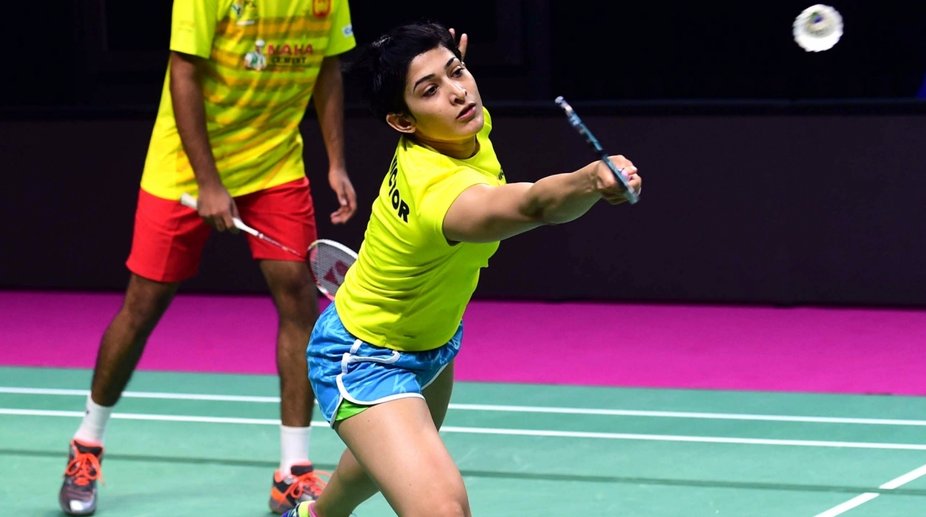Rankireddy-Ponnappa upset World No 7 pair at China Open
The Indian duo defeated the sixth-seeded pair 22-20, 17-21, 21-17 in a thrilling opening round clash that lasted for more than 50 minutes.
Ashwini also asked for a change in mentality towards doubles and stressed on the parity of prize money.

Ashwini Ponnappa (Photo: IANS)
Experienced Indian women's doubles exponent Ashwini Ponnappa on Friday said she and her partner N Sikki Reddy need to work on their defence and be patient on court to clinch a medal at next month's World Badminton Championships in Glasgow.
“I think one of the areas is consistency. In India when we play we get very quick points and we also expect the same when we play outside because that's how we have practiced, we don't like prolonged points,” Ashwini told PTI on the sidelines of the three-day national finale of Junior badminton championship (JBC) season 3 here.
“And all the other nations like Japan are very patient while they play. If things don't go their way, they very quickly get defensive. So I would say we probably need to get a little more stronger in our defence and get more patient in that matter,” she said.
Advertisement
Asked what's the target in the August 21-27 World Championships, Ashwini said: “To do the best that I can and hopefully win a medal.”
Ashwini started playing with Sikki last November after breaking up with Jwala Gutta and the new pair has already reached World No. 25.
The 27-year-old from Bangalore has been playing with B Sumeeth Reddy and Satwiksairaj Rankireddy in mixed doubles.
While with Sumeeth, she reached the finals at Syed Modi International Grand Prix Gold. She had some good matches with the 16-year-old Satwik in Sudirman Cup.
“Sumit and I would be playing at the World Championships. Satwik and I have just played 2 tournaments and our rankings are really low, so to play somewhere like superseries, we need to play a lot more of small tournaments,” she said.
Asked if she regrets not playing mixed doubles seriously all this while, Ashwini said: “I don't miss playing mixed doubles at all. I had a wonderful time playing women doubles and when I played women doubles, my role was on the back and I made that area of mine very strong and it helped me a lot.
“I have changed my style of play in mixed doubles also. Earlier, when I used to play mixed, I used to run back and let my male partner face the net, but now am making conscious efforts to take the net and let my partner take the back so that is definitely helping both women and mixed doubles,” she said.
Ashwini also asked for a change in mentality towards doubles and stressed on the parity of prize money for doubles in tournaments.
“Doubles should be given importance at the grassroot level. If you don't give doubles importance at the grassroot level, how you expect them to do well at the international scene?” she asked.
“I think a lot more could be done compared to what is being done. Right now youngsters don't try to get into doubles. It's like if you play singles then you get all the limelight, if you can't play singles then you go to doubles, and that should not really be the mentality.
“If you portray doubles as an event as equally important and have probably the same prize money structure and when you win you have your photograph in the paper, then it might make a difference to kids and it would be more like an event they could focus on,” said Ashwini.
Ashwini, who won the Commonwealth Games gold and silver in women's doubles along with Jwala in 2010 and 2014, said things were slowly changing especially with the Indonesian coach Tim Kim Her coming on board.
“Having a doubles coach is really important and the mentality is changing slowly. Probably it will take some more time but it is changing as it is positive thing having a doubles coach and many children are getting mentored at a young age.
“In the past we never really had a doubles expertise because as a country we have never been double-centric. Having these coaches and giving us inputs have helped us as players and having them here for a long time definitely helps.
“When I started playing, I was always a singles player, doubles was not an event which I looked like I wanted to play. Despite the fact that I have won maximum of my medals in doubles, still it was singles which was my main event and doubles was the second event, because thats how it has always been portrayed.”
Ashwini, who was the chief guest at the national final of PNB METLIFE junior championship, also said such events help kids to showcase their talents. The event has seen more than 15,000 kids participating in the last three editions.
“It is great to see the kids getting such opportunities where they can express themselves and showcase their talents. I wish we had such opportunities. But I am little surprised that there is no doubles event. May be they can include next edition,” she said.
Advertisement